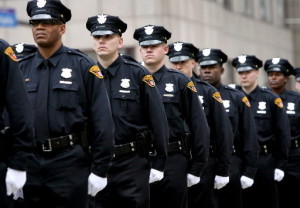Criminals have always attacked police. There’s nothing new about that, it’s been going on for 100+ years. The good news is that deadly assaults against police have declined dramatically in recent years.
Meanwhile, police kill 10 civilians, some needlessly, for every cop who’s killed by a criminal. In many cities and towns, cops have acquired a reputation for bullying, racial harassment, and mistreatment of citizens that is well-deserved. Police departments, more often than not, protect rogue cops instead of disciplining or terminating them. Given these circumstances, public suspicion of police is their own damned fault.
At the same time, let us never lose sight of the fact that there are legions of honorable police officers who perform their difficult — and sometimes dangerous — job properly and well. They deserve our wholehearted support, and then some.
No one in their right mind wishes for harm to befall any police officer, even those we wish weren’t police officers; and threatening or assaulting a police officer is a criminal act. No civilized person wants criminals in charge of our streets. The police are what stands between us and the jungle.
 But we don’t want the police to become thugs, either. The public has legitimate concerns about the state of American policing, and there’s a genuine need for reform, especially in the use of force. In America, cops kill over 1,000 civilians a year; Great Britain, with about a fifth of our population, averages roughly 1. In other words, American cops kill people at about 200 times the rate of British cops, yet there’s no evidence this bloodletting makes Americans safer than Brits. This is a facet of American policing that needs urgent repairs.
But we don’t want the police to become thugs, either. The public has legitimate concerns about the state of American policing, and there’s a genuine need for reform, especially in the use of force. In America, cops kill over 1,000 civilians a year; Great Britain, with about a fifth of our population, averages roughly 1. In other words, American cops kill people at about 200 times the rate of British cops, yet there’s no evidence this bloodletting makes Americans safer than Brits. This is a facet of American policing that needs urgent repairs.
Some police leaders say they feel under siege. (Read the story here.) Certainly, it’s not helpful when BLM protesters chant, “Pigs in a blanket! Fry ’em like bacon!,” as they did last week in Minnesota. Under our Constitution, with its First Amendment, they’re entitled to do that; but the fact such speech is protected under our laws doesn’t make it a good idea. Demonstrators discredit themselves and their movement by using such rhetoric.
At the same time, it’s not helpful for police chiefs, sheriffs, and police union officials to respond to such incidents by whining that reformers are painting targets on cops’ backs. There are lots of things wrong with this rhetoric. It’s basically not true, it’s divisive, it reinforces the destructive “us-vs-them” police mentality, and it comes across as the police digging in their heels, justifying and defending the status quo, and opposing needed reforms. Responsible police leadership would say, “We know we have problems, we’re working to solve them, and we want your help and support.”
America’s law enforcement is in crisis. Their legitimacy is at risk. Police officials need to recognize this, and address it by fixing the things that are wrong with American policing. Changes are needed in police recruiting, training, supervision, and practices. The American public expects to be protected from crime by their police, and is unwilling to be harassed, bullied, or mistreated by the police. If these things aren’t remedied, the police will indeed come to be seen as a public enemy.